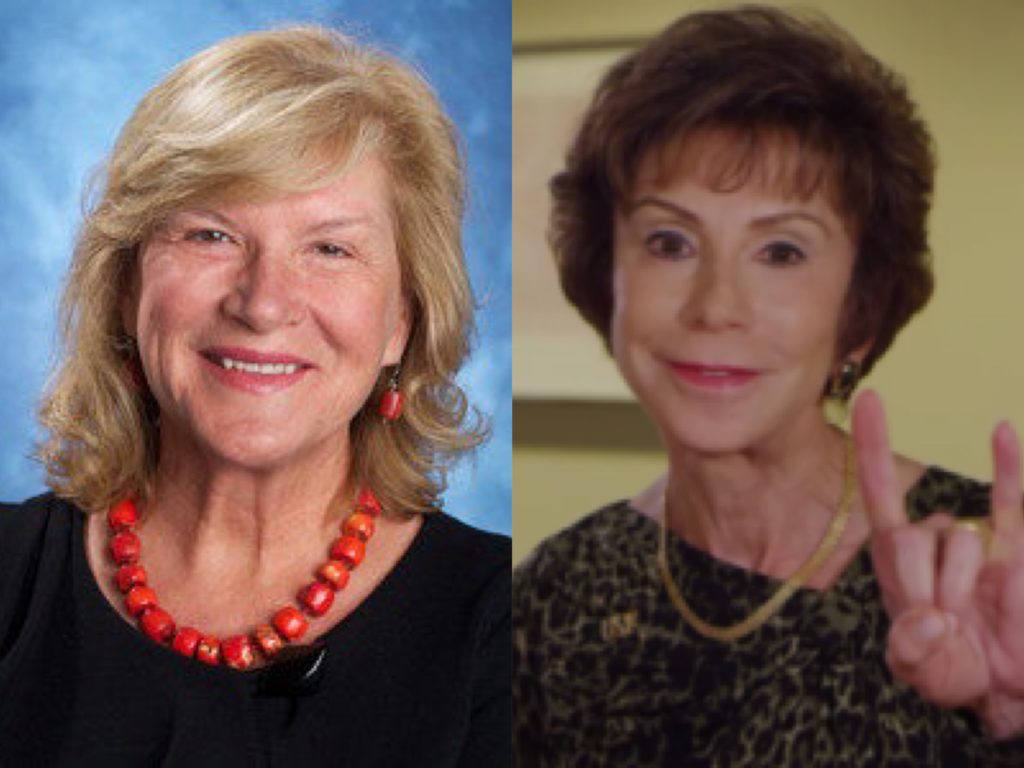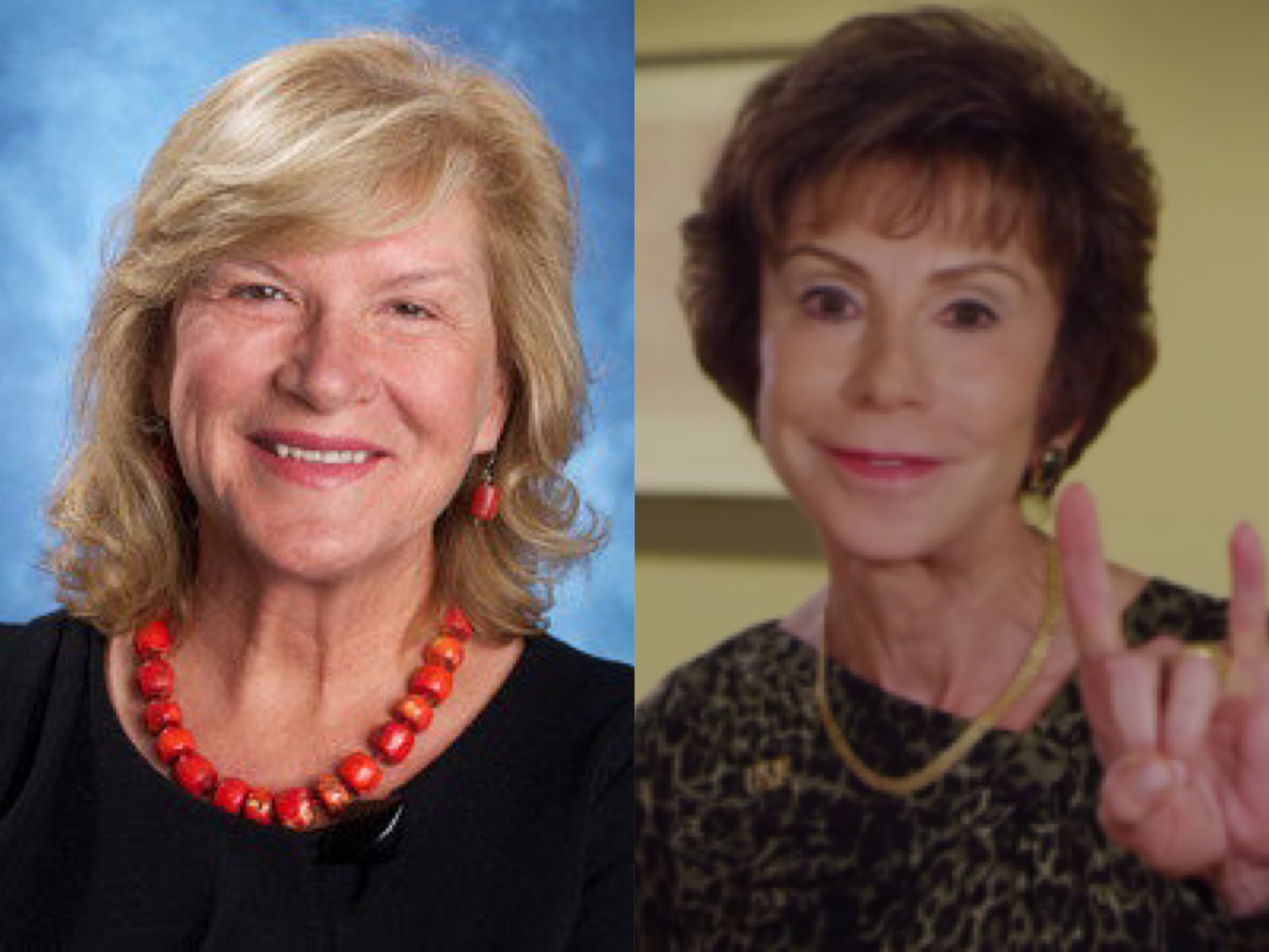
Courtesy of Sophia Wisniewska and USF
By Emily Wunderlich and Nancy McCann
Nineteen months after she was ousted for the way she handled preparations for a looming hurricane, former Regional Chancellor Sophia Wisniewska has struck back.
She filed a lawsuit against the USF system and President Judy Genshaft alleging breach of contract, defamation, intentional infliction of emotional distress and wrongful interference with a business relationship.
The suit, filed April 26 in Hillsborough County Circuit Court, alleges that the draft of a letter from Genshaft to Wisniewska firing her “for cause” was sent to the Tampa Bay Times while the two were negotiating a less explosive resignation agreement that they ultimately adopted.
“Genshaft’s actions (in sending the draft) were intentional and outrageous,” the complaint says.
The draft letter, which was quoted in the Times on Sept. 19, 2017, criticizes Wisniewska for hesitating to close the campus and then leaving the state without ensuring proper arrangements had been made.
In the draft, Genshaft said Wisniewska’s “lack of leadership” created an “intolerable safety risk” for the USF St. Petersburg community.
“No one is expected to remain vulnerable in a dangerous situation,” the draft said. “But it is expected that the Regional Chancellor will recognize that a clear chain of command must be established and that emergency operations and communications expertise are vital before, during and after a natural disaster.”
But Wisniewska argues that she “competently fulfilled her role as the Regional Chancellor for USFSP” by keeping in contact through phone calls and emails until the storm threat was over.
Under the resignation agreement she and Genshaft ultimately signed, the draft of the termination letter would not be placed in her personnel file and therefore would not be subject to the Public Records Law.
The agreement also stated that both Genshaft and Wisniewska would “refrain from professionally derogatory comments regarding USF and each other, including but not limited to comments that could reasonably affect employability and professional standing.”
Wisniewska contends that her reputation, professional standing and employability have all been damaged by the release of the draft letter.
Wisniewska, 67, now lives in California. She worked for a time as a senior adviser at the University of San Diego, according to her LinkedIn profile. On Wednesday, she declined to comment on her status and the lawsuit.
Her lawsuit was filed by Charles Eiss, an attorney in Broward County who specializes in employment law.
In a statement, USF system spokesperson Adam Freeman said university leaders “strongly disagree with Dr. Wisniewska’s claims and we look forward to defending the decisions made around the time of her separation from USF.”
“The complaint is unexpected, as Dr. Wisniewska waived her right to future legal actions against the university in her resignation agreement,” he said.
Tumultuous change
The lawsuit comes just weeks before Genshaft is scheduled to retire and marks another chapter in her uneasy relationship with the St. Petersburg campus.
Six times in her 19 years as president of the USF system, Genshaft changed the leadership in St. Petersburg – a pattern that some senior professors contend has disrupted the momentum of the campus.
Perhaps no change was as tumultuous as the abrupt ouster of Wisniewka on Sept. 17, 2017.
As the campus reeled in confusion and dismay, Genshaft let subordinates and public records – including the draft of the termination letter that was never sent – speak for her.
That rankled some senior professors, who complained that Genshaft routinely acted without consulting faculty in St. Petersburg and that the campus had made great strides in Wisniewksa’s four years as regional chancellor.
Longtime history professor Ray Arsenault said Wisniewska’s ouster was “more like an execution than a resignation.”
In her stint as regional chancellor, USF St. Petersburg made progress on several fronts.
It developed a five-year academic plan that reset the direction of the campus and updated its master plan, which anticipates a student body of 10,000 by 2025.
It bought property from the Poynter Institute, landed one private donation of $10 million and another of $5 million, opened a new building for the College of Business and made plans for a third residence hall.
Wisniewska told The Crow’s Nest that she was “proud to have moved the needle on the ranking and visibility of our campus.”
A looming hurricane
It was the approach of Hurricane Irma that brought Wisniewska’s downfall.
For several days, forecasters warned that Irma, a powerful Category 3 or 4 storm, might pass through Tampa Bay.
On Sept. 6, 2017, the USF system canceled classes but left residence halls open while awaiting further hurricane forecasts. Documents indicate that Genshaft and Wisniewska then disagreed on whether and when the USF St. Petersburg residence halls should be evacuated.
Wisniewska’s team wanted to order student evacuations on Sept. 7, but Genshaft countermanded that directive. Then when Genshaft shifted direction, Wisniewska waited until she got legal advice to act.
Wisniewksa said the last 10 students were gone by 10 a.m. on Sept. 9 and the campus was secure. Then, because her home was in an evacuation zone and local hotels were full, she left St. Petersburg to drive to Atlanta –without telling Genshaft.
Asked at 4:17 p.m. on Sept. 9 for a status report, Wisniewska responded by email at 11:18 p.m. that as she walked around campus, “I heard more birds chirping than students talking. The campus is very quiet.”
At 8:56 a.m. the next day, Wisniewska emailed another status report about USF St. Petersburg, adding this P.S.: “Last night, I arrived in Atlanta where I will stay the next two days.”
Stunned that Wisniewska had left town without advising her, Genshaft prepared the draft letter of “termination for cause” that was never finalized.
In that draft, Genshaft accused Wisniewska of creating “an intolerable safety risk to our students and the USFSP community.” She said Wisniewska resisted her directive to evacuate students, then left the state “without first notifying this office or ensuring that a clear chain of command was in place.”
Wisniewska pushed back in a blunt response, and she and Genshaft then agreed to a voluntary resignation agreement that makes no mention of the hurricane preparations and Wisniewska’s decision to evacuate.
“I was taken aback by insinuations that I was purposefully misleading people about my whereabouts when I evacuated to Atlanta,” Wisniewska told The Crow’s Nest later.
But she acknowledged that she should have been clearer in the email that mentioned chirping birds that she was “describing the campus before I left.”
As it happened, Hurricane Irma eventually skirted past Tampa Bay and did not do significant damage here.



